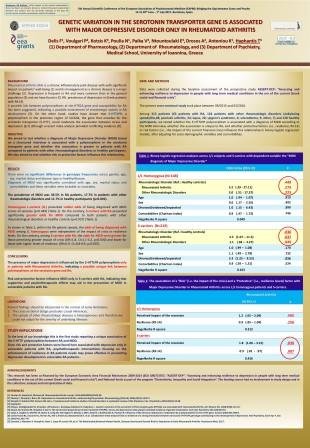Congress Communication #9
Genetic variation in the serotonin transporter gene is associated with major depressive disorder only in rheumatoid arthritis
Hyphantis Thomas, Voulgari Paraskevi, Delis Foteini, Kotsis Konstantinos, Poulia Nafsika,Paika Vassiliki, Ntountoulaki Elisavet, Antoniou Katerina, Drosos A Alexandros
5th Annual Scientific Conference of the European Association of Psychosomatic Medicine - EAPM, Barcelona, Spain, June 28th - July 1st, 2017
Genetic variation in the serotonin transporter gene is associated with major depressive disorder only in rheumatoid arthritis
Hyphantis Thomas (a), Voulgari Paraskevi (b), Delis Foteini (c), Kotsis Konstantinos (a), Poulia Nafsika (c),Paika Vassiliki (a), Ntountoulaki Elisavet (a), Antoniou Katerina (a), Drosos A Alexandros (b)
(a) Department of Psychiatry, Medical School, University of Ioannina, Greece
(b) Department of Rheumatology, Medical School, University of Ioannina, Greece
(c) Department of Pharmacology, Medical School, University of Ioannina, Greece
Aims: Major depressive disorder (MDD) is frequent in Rheumatoid Arthritis (RA) and a possible link between polymorphisms at the serotonin gene and susceptibility to both MDD and RA has been also suggested. We aimed to test whether, in patients with RA, a diagnosis of MDD is associated with a polymorphism in SLC6A4, the gene that encodes for serotonin transporter (5-ΗΤΤ), and whether risk or protective factors influence this relationship.
Methods: The sample comprised 315 participants; 63 patients with RA, 124 patients with other rheumatologic disorders (ancylosing spondylitis, 48; psoriatic arthritis, 34; lupus, 20; sjogren’s symdrome, 6; scleroderma, 9; other, 7) and 128 healthy participants. We tested whether the 5-HTTLPR polymorphism is associated with diagnosis of MDD according to the MINI interview, whether this association is unique to RA, and whether protective factors (i.e., resilience, RS-14) or risk factors (i.e., the impact of the current financial crisis) influence this relationship in binary logistic regression models, after adjusting for socio-demographic variables and comorbidities.
Results: Homozygous L-carriers (LL) presented similar odds of being diagnosed with MDD across all samples (p=0.449). On the contrary, S-carriers with RA presented significantly greater odds for MDD compared to both patients with other rheumatological disorders or healthy controls (OR=3.5, CI=1.1-11.3, p=0.037). Within the RA patient sample, the odds of being diagnosed with MDD among LL homozygous were independent of the impact of crisis or resilience levels. On the contrary, among S-carriers with RA, the odds for MDD were greater for those perceiving greater impact of crisis (OR=1.8, CI=1.1-3.2, p=0.030) and lower for those with higher levels of resilience (OR=0.9, CI=0.8-0.9, p=0.007).
Conclusions: The presence of major depression is influenced by the 5-HTTLPR polymorphism only in patients with RA, indicating a possible unique link between polymorphisms at the serotonin gene and RA. Risk and protective factors influence MDD only in S-carriers with RA, indicating that supportive and psychotherapeutic efforts may aid in the prevention of MDD in vulnerable patients with RA.
Acknowledgements: This research has been co-financed by the European Economic Area Financial Mechanism 2009-2014 (EEA GR07/3767) and National funds as part of the program “Dissimilarity, Inequality and Social Integration”.



